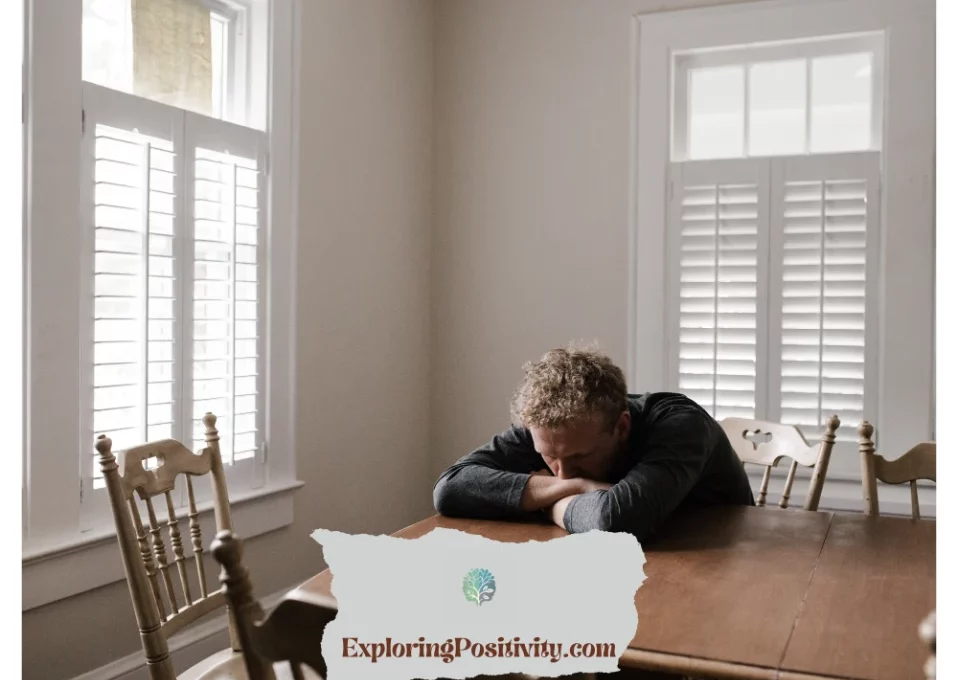Have you ever felt like you can’t seem to express what you’re feeling inside? Like your emotions are all bottled up with nowhere to go? This feeling is often called “emotionally constipated”- the inability to fully experience or convey your inner emotional world.
Emotional constipation can be frustrating, isolating, and detrimental to mental health. Emotions can build up inside us and cause distress when they can’t flow freely. Fortunately, with some self-awareness and the proper techniques, it is possible to get emotionally unblocked.
What Causes Emotional Constipation?
There are a few key reasons why someone might become emotionally constipated:
Lack of Emotional Awareness
Some people aren’t very in tune with their feelings and aren’t able to readily identify or describe their emotions. Without this self-awareness, it isn’t easy to express feelings to others.
Suppression of Emotions
Sometimes, emotions get suppressed as a defensive reaction if we’ve been taught to hide, ignore, or be ashamed of our feelings. Over time, this can cause us to suppress emotions automatically.
Fear of Vulnerability
Expressing emotions openly makes us feel exposed. If we fear judgment, rejection, or ridicule, we may reflexively bottle up what’s inside to protect ourselves.
Belief That Emotions Are a Weakness
If we think feeling sad, scared, hurt, or lonely makes us weak, we might try to deny, minimize, or numb those emotions. But this buries them within us.
Lack of Emotional Vocabulary
To articulate emotions, we need words to describe what we’re experiencing. Some of us have a limited vocabulary for naming nuanced feelings.
Childhood Environment
Children often learn to internalise feelings as a coping mechanism if caregivers discourage emotional expression or are unavailable. This can persist into adulthood.

Signs You May Be Emotionally Constipated
Are you emotionally blocked up? Here are some common signs:
- You often feel irritable, restless, or “on edge” for no apparent reason
- You bottle up feelings until you explode in anger or tears
- You feel disconnected from yourself and don’t know how you’re feeling
- Expressing emotion feels awkward, scary, or embarrassing
- You numb or distract yourself from emotions rather than feel them
- Others see you as insensitive, stoic, or unemotional
- You experience physical symptoms like muscle tension, headaches, or stomach problems
If more than a couple of these resonate, you could suffer from emotional constipation. The good news is there are many effective ways to get unblocked!
Getting Unconstipated: Tips to Start Expressing Yourself
Becoming more open and comfortable expressing emotion takes patience, courage, and practice. But little by little, you can get those feelings flowing freely! Here are some tips:
Get Curious About Your Emotions
Start paying closer attention to your inner experience, even if you struggle to identify sensations and shifts. Keep a journal to record emotional states and any patterns you notice.
Expand Your Emotional Vocabulary
Increase your ability to name nuanced feelings by studying emotion words. Start with the basics like happy, sad, angry, and afraid. Then, expand into more subtle shades of emotion.
Spend Time in Self-Reflection
Set aside regular time to check in with yourself. Silently ask, “What am I feeling right now?” or “What do I need right now?”. Listen inwardly for any stirrings.
Allow Yourself to Fully Feel
Rather than numbing, ignoring, or rejecting painful emotions, allow yourself to close your eyes and fully experience them. Breathe into the sensations.
Share Vulnerably With Trusted Friends
Open up to close friends or relatives who you feel safe with. Be honest about your inner world. Ask for support, not judgment.
Seek Counseling or Join a Support Group
Speaking openly to a therapist or sharing in a supportive group environment can help you gain confidence in expressing yourself.
Use Creativity as an Emotional Outlet
Try creative activities like art, music, dance, drama, or freestyle writing to unlock buried feelings—no need to judge the results.
Identify and Challenge Limiting Beliefs
If you think expressing emotions is indulgent, dramatic, or attention-seeking, work to replace those beliefs with more accepting ones.
Set Healthy Boundaries
If certain people make you feel unsafe or mocked for sharing feelings, set firm boundaries around them or limit contact if needed.
Practice Emotional Mirroring
When conversing, reflect on what others feel to show you relate—this model’s emotional expression.
Role Play Scenarios
Practice expressing feelings out loud, even exaggeratedly. Laugh at yourself if it feels awkward at first. It gets easier!
Discuss Emotions More Openly
Bring emotions into everyday conversation with phrases like “I feel excited about…” or “That made me really anxious.” Normalize it.
Be Patient and Persistent
Emotional change takes time and ongoing effort. Keep going. With consistent practice, conveying your inner world will feel natural.
The path to emotional freedom is different for everyone. Try various techniques and see what resonates. Committing to the process allows you to move through constipation into a healthy dynamic flow.

What’s Causing Your Emotional Blockage?
Emotional constipation can stem from many sources. To get unblocked, it helps to pinpoint potential causes. Here are some of the most common:
1. Dismissive Childhood Environment
If your family disregarded emotions or penalized emotional expression, you likely learned to disconnect from your feelings at a young age. This coping mechanism then became ingrained as a reflex.
To address this root cause, you may need to process old hurts, grieve what you needed but didn’t get, and work to replace restrictive childhood conditioning with new adult patterns.
2. Trauma or Adverse Experiences
Past abuse, neglect, loss, or other trauma can cause us to bury emotions to survive at the time. To break this pattern, working with a trauma specialist to heal old wounds may be necessary before you can freely express the feelings locked inside.
3. Social or Cultural Norms
Some communities encourage emotional restraint and consider overt displays of feeling inappropriate or taboo. If this was modeled for you, allowing more emotional flow may require challenging cultural assumptions.
4. Judgment from Loved Ones
If specific family or friends react harshly when you express vulnerability, anger, grief, or other emotions, you may silence yourself around them. Evaluate whether limiting contact is an option.
5. Loss of Trust in Relationships
Past betrayals, breaches of confidentiality, or romantic rejections following emotional openness can breed distrust. Healing these old hurts can allow you to trust vulnerability again.
6. Habit of Emotional Suppression
Muting emotions started as a short-term coping mechanism for some but became an entrenched, almost unconscious habit over time. Bringing this pattern into awareness is key.
7. Poor Self-Esteem
Exposing your authentic self may feel scary or dangerous if you feel unworthy or undeserving at a core level. Building self-compassion is essential. You are worthy of being known.
8. Perfectionism
Perfectionists often repress “negative” emotions like sadness or anger to maintain poise and composure. But this breeds disconnection from self. Striving to accept all your feelings is needed.
9. Medical or Mental Health Issues
In some cases, emotional numbness or disconnection can result from medications, depression, trauma disorders, or other mental health conditions. Seeking medical advice is recommended.
10. Lack of Positive Role Models
If you didn’t grow up around emotionally intelligent role models, you may not have learned skills for processing and communicating feelings. Surrounding yourself with these people now can help.
Take time to reflect on your unique emotional patterns and what environmental or behavioral factors may be at their root. Seeing your blockage is the first step toward dissolving it.

How Emotional Constipation Impacts Your Health and Relationships
Bottling up emotions may help you survive challenging circumstances in the moment. But in the long term, the physical, mental, and social costs are high.
Physical Effects
Suppressed emotions can manifest as:
- Chronic muscle tension
- Headaches and migraines
- Sleep disturbances and fatigue
- Gastrointestinal issues
- Lowered immunity
- High blood pressure
Psychological Effects
Emotional numbness is linked to:
- Anxiety or restlessness
- Irritability and emotional volatility
- Depression
- Feeling disconnected from self and others
- Emotional eating or substance abuse
- Poorer cognitive function
Relational Effects
Constipated emotions commonly lead to:
- Communicating less openly with loved ones
- Difficulty maintaining close friendships
- Strained family relationships
- Feeling unsatisfied in romantic relationships
- Co-dependent relationship patterns
- Social isolation and loneliness
As you can see, the costs of not expressing emotions are far-reaching. Prioritizing emotional health goes hand in hand with nurturing total mind-body wellness.
Are You Emotionally Generous? Ways to Support Others’ Expression
If you find emotions challenging to discuss yourself, you may also struggle when others try to open up. Becoming more comfortable “holding space” is an important skill to build. Here are some tips:
Be Present and Attentive
Give your undivided attention when someone is sharing vulnerable feelings. Avoid distractions and be engaged.
Listen More Than Talk
Allow them to speak without interruption. Ask clarifying questions if needed, but keep the focus on yourself.
Suspend Judgment
React supportively even if you disagree with the content. Don’t criticize their feelings as irrational or exaggerated.
Allow Silences
Give space for processing and reflection. Take your time filling quiet moments. Silence can deepen sharing.
Offer Empathy
Let them know you understand their feelings without trying to “fix” or solve anything. Acknowledge how hard it must be.
Validate Their Reality
Don’t minimize their experience or make light of their struggles. What’s natural to them is real. Respect that.
Keep Confidences
Keep vulnerable disclosures private. Don’t share without permission. Follow through on promises.
Check In Later
Follow up to show you remain supportive, not just in the moment. Emotional needs evolve.
Holding space for others’ emotional needs takes practice if it initially feels foreign. But nurturing this generous spirit enriches our connections immeasurably.

Finding Healthy Emotional Release Valves
The wave of new feelings can sometimes seem overwhelming when learning to open up emotionally after years of constipation. That’s why it’s essential to identify healthy release valves. Here are some to try:
Creativity – Painting, writing, playing music, and other arts are beautiful outlets for unleashing bottled-up feelings.
Exercise – Releasing anger or sadness through running, dance, yoga, or sports can be very cathartic.
Nature – Spending time outdoors can soothe and calm turbulent emotions, especially among trees.
Journaling – Pouring feelings onto paper, primarily as a stream of consciousness, provides an emotional drain.
Therapy – A safe, confidential space to air painful feelings provides healing.
Support Groups – Sharing emotional struggles with others facing similar challenges feels liberating.
Crying – Allowing yourself a good cry, even watching “tearjerker” movies, can feel cleansing.
Spiritual Practices – Meditation, prayer, chanting, and other rituals align us with something more significant.
Self-Care – Relaxing baths, soothing music, calming tea – anything that comforts and nurtures helps.
Close Friends – Those who truly know and accept you can be a soft place to fall when unraveling.
Remember to praise yourself for the courage to open up as emotions flow forth. You deserve to feel heard and understood. You are wishing you freedom on your journey!
Conclusion
In conclusion, it is critical to our general wellbeing and interpersonal connections that we overcome emotional constipation and learn how to express ourselves freely.
We can enhance our mental and emotional well-being by identifying and resolving the emotional obstacles that keep us from communicating our ideas and emotions to others.
By applying strategies like introspection, candid dialogue, and asking for help from reliable people, we may progressively clear our emotional channels and build happier, more satisfying relationships with both ourselves and other people.
Recall that while achieving emotional freedom may take some time and work, the benefits of genuine self-expression and emotional independence are priceless.
Alexithymia is an inherent inability to identify or describe emotions using words, which can cause inner turmoil. Emotional constipation more often develops from learned suppression of feelings we can internally recognize.
Making some headway is possible with self-help books, introspection, and trying the tips here. But for many, speaking openly to a therapist provides immense breakthroughs. There’s no shame in needing support.
Yes, if constipation stems from depression or another condition. Certain SSRIs and SNRIs may improve the ability to experience feelings. But medication alone is rarely enough. Talk therapy addresses root causes. Discuss options with your doctor.
With time, you’ll likely find balance – neither numbing out nor feeling constantly overwhelmed. Think of it as strengthening an emotional “muscle” that’s been dormant. Patience with yourself is key.




